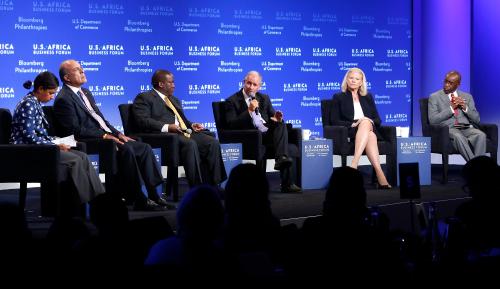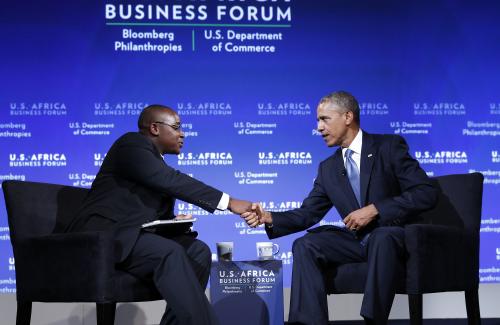Editor’s Note: On September 21, the Department of Commerce and Bloomberg Philanthropies are hosting the second U.S.-Africa Business Forum. Building on the forum in 2014, this year’s meeting again hosts heads of state, U.S. CEOs, and African business leaders, but aims to go beyond past commitments and towards effective implementation. This year’s forum will focus on seven sectors important to African economies and which offer opportunities for investors—namely finance and capital investment, infrastructure, power and energy, agriculture, consumer goods, and information communication technology. The below piece reviews the theme of information communication technology as an opportunity for investment on the African continent.
Public sector and non-government stakeholders globally are leveraging the power of information and communication technology (ICT)—including mobile phones, tablets, and widely (though still not universally) available internet access—to revolutionize diverse sectors such as education, health care, and agriculture. While ICT investment has often been viewed as an outgrowth of robust economies, its development is increasingly also recognized as a key mechanism for driving economic growth and social progress in developing economies by helping to efficiently scale vital services.
One area of ICT that holds significant transformative potential in Africa is the application of mobile technology within the formal financial ecosystem. Specifically, mobile money has played a pivotal role in accelerating access to and usage of formal financial services among underserved individuals within many communities in Africa. As noted in the 2016 Brookings Financial and Digital Inclusion Project Report, consumer engagement with convenient, affordable, and appropriate financial tools, such as mobile money products, helps promote women’s economic empowerment, reduce costs for governments and businesses, and fuel economic growth. In other words, financial inclusion is a key ingredient in achieving broader policy objectives.
Africa has already experienced considerable progress with respect to the development and adoption of mobile infrastructure, products, and services; indeed, usage of mobile technologies and services in Africa generated more than $150 billion in economic value as of 2015. Yet further investment in Africa’s mobile sector is needed to enhance the accessibility, reliability, and efficiency of mobile-based services. For example, technical interruptions such as mobile network outages have been identified as last-mile issues facing many mobile money customers in Africa, according to research organizations such as InterMedia and the Helix Institute of Digital Finance.
Moving forward, investors in the United States should be attuned to a growing array of opportunities for investment in Africa’s mobile ecosystem in order to support the availability and adoption of financial services that enhance financial inclusion and propel sustainable growth.








Commentary
The US-Africa Business Forum: ICT investment can drive economic growth
September 14, 2016